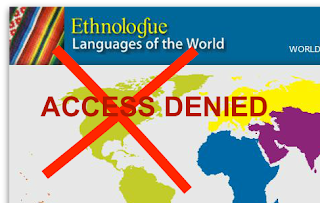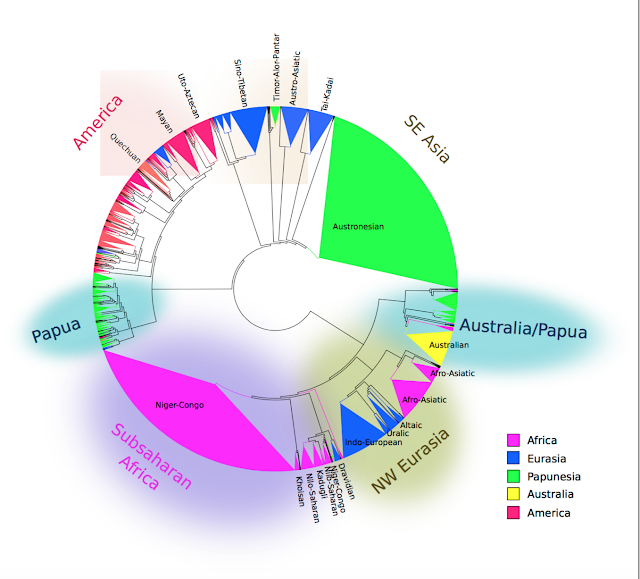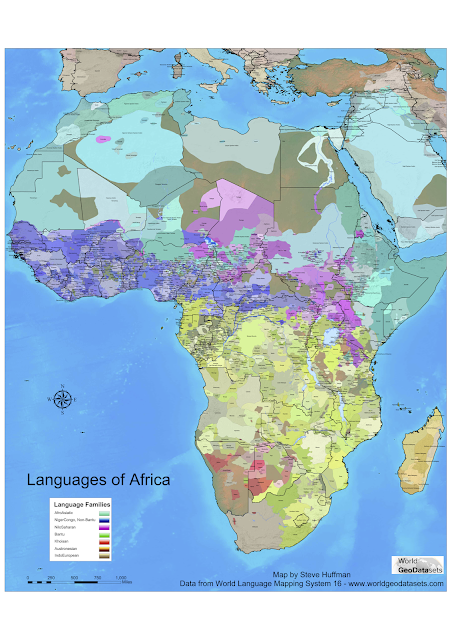Ethnologue more restricted
Basics on the pay-wall
We haven't received much detailed information on this change, but if it's the same as last time it means that users with IP-addresses in countries that are classified by the world bank as "high-income" will be restricted. Cloudflare would appear to be the service provider managing this for Ethnologue. Previously, we've learned that only 5% of users look at more than 7 pages per month. We don't know how many go to more than 1 page (probably a lot more though!).
SIL International also maintains the ISO 639-3 codes for language names (one of 6 language ISO-codes). Those pages are NOT affected by this restriction. Ethnologue and SIL International are not the same thing, SIL International produce more things than just Ethnologue.
Old editions of Ethnologue have different restrictions than the current edition.
Ethnologue is mainly funded by Wycliffe Global Alliance (an explicitly Christian organisation), and not by any state or academic institution. This information is based on what I understand from financial statements, I may be mistaken. Clarification form Ethnologue/SIL International staff is highly appreciated here. Please note that there are many other ISO industry standards that are pay-access only, the fact that SIL International provides 639-3 openly is fortunate.
It appears to us, the users, that SIL International have made these decisions to remedy a financial situation. It is not clear at this time if SIL International is seeking other ways of bringing in funds, like more traditional grants from research councils.
Where to go instead?
Much of the information that Ethnologue provides is actually available elsewhere. Here is a table displaying some of the places you could go to instead of Ethnologue.
| Family trees | MultiTree, Glottolog |
| Codes | Glottolog, ISO 639-3 repository |
| Alternative names | Glottolog |
| Endangerment level | UNESCO Atlas of the World's Languages in Danger |
| Maps of language areas (polygon data) | Langscape |
| Population stats | (Old Ethnologue editions), CIA World Factbook, Wikipedia |
The information that Ethnologue provides that is the hardest to replace is population stats. The pages that I regret the most that I cannot access are the overall summary stat pages, they're nice for showing size of language families and the power law of speaker populations.
Here is some more details on some of the resources listed above.

MultiTree
MultiTree is by Linguist List and is a catalogue of lots of different language trees. You can search through the database for lots of different trees and compare them, very cool!
Glottolog
Glottolog is provided by the Max Planck Society, and edited by Harald Hammarström, Robert Forkel and Martin Haspelmath. Most of the detailed curation of the data is managed by Harald. Glottolog provides a lot of information, mainly language codes, trees, location (dots, not polygons) and references. Each tree in Glottolog has a clear reference to a published source, which is very handy. There is also clear information on how the classification is handled.
If you disagree with information you find on Glottolog, or want to add information, you can file a GitHub-issue or click the little alarm bell symbol on the relevant page.
UNESCO Atlas of Languages in Danger
This atlas is the complimentary online version of the 2010 print edition and edited by Christopher Moseley. It contains information on 2,464 languages. This is the scale, and the number of languages at each level:
- Vulnerable (592)
- Definitely endangered (640)
- Severely endangered (537)
- Critically endangered (577)
- Extinct (228)
Langscape
Langscape is a website by the Maryland Language Science Center. They provide games, lesson material for teachers and - most interestingly to us - maps. These interactive maps are actually based on the polygon set of SIL International, and they're not available for download freely. They are however accessible in the interactive web browser interface. One way you can see that these are Ethnologue polygons, is that the genealogical classification is the same. For example: Mande languages are marked as the same family as Bantu languages (not the case in Glottolog).
One of the games that Langscape has is an identification game, not that different from the Great Language Game that we wrote a paper about! We also made a new game, LingQuest, that you can play.
Alright, now you know. Best of luck with whatever research you have that is dependent on this kind of information.
Questions for Ethnologue/SIL International staff (should they be reading)
- will the ISO 639-3 codes ever be behind a pay-wall?
- are there other products of SIL International that may become like Ethnologue?
- is it still only in effect in high-income countries (according to the world bank)?
- is it intentional that the Ethnoblog and the summary statistics pages are included under the pay-wall?
- how are Ethnologue and SIL International funded?
- have you considered other funding options?
- how does Ethnologue and SIL International see their own roles in modern academia and some academics dependence on the data, despite these resources not being traditionally funded by academic institutions?
- why was the change made?
- was the change announced anywhere publicly?
- how many users access more than 1 page per month?
- how many users access more than 7 pages per month?
- how has the user stats changed the past 2 years?
- how many of your users are commercial and how many are academic, by estimation?
***
EDIT
Note that Ethnologue is not only used by the academic research community, but also by commercial and governmental institutions (for example in this scandal). In fact, considering the new restrictions on access and problems with the basic data (opaque decisions and sources), perhaps academics shouldn't really use Ethnologue much at all.
EDIT
Note that Ethnologue is not only used by the academic research community, but also by commercial and governmental institutions (for example in this scandal). In fact, considering the new restrictions on access and problems with the basic data (opaque decisions and sources), perhaps academics shouldn't really use Ethnologue much at all.





Comments
Post a Comment